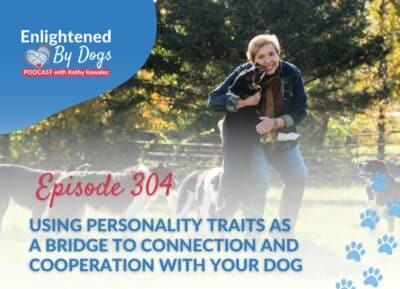
You may think that you’re listening to your dog’s wants and needs, but listening isn’t always what you think it is.
We all want to do what’s best for our dogs. However, sometimes, in the quest for a successful relationship, we can get stuck pursuing traditional training methods that just aren’t working. The reality is, truly listening to your dog can look very different from how you might have imagined it.
When you open up your mind and your heart to your partnership’s possibilities, that’s when things can really start to change – especially if you have a reactive dog.
Steph Taleb and her dog, Pow, are a perfect example of how real listening can build a strong, thriving partnership. Steph joined the Brilliant Partners Academy (BPA) back in 2018, looking for a better way to calm and bond with Pow. Their partnership now shows how far you can come when you invest in deeply listening, and in openness. This is their story. It’s a story that never gets old, it’s one of my listener favorites, and mine too!
Key Takeaways:
- How Pow and Steph began their journey to a brilliant partnership
- What to do when traditional training doesn’t work
- Why Steph turned to the Brilliant Partners Academy
- How to embrace real listening
- Why expectations and compliance could be holding your relationship back
Memorable Quotes:
“What it feels like to listen to her now is that there’s a flow between us. It’s a gentle flow of energy between us that is organic.”
“It was like a teacher-student relationship – now it’s a partnership.”
“My idea of what perfect was, of having a perfect dog, of trying to make her perfect, doesn’t even exist anymore.”
“Once I got rid of that pressure and that stress of compliance, then she wanted to come to me.”
“Open your mind. Listen to your heart. Your relationship with your dog will transform.”
LOVE TO LEARN MORE?
Become a calm and confident Dog Mom with a cooperative, happy dog … without obedience training, relying on treats or arousing games, or corrections of any type.
Here are some next steps:
- GET STARTED – Work with Kathy:
https://dancinghearts.link/foundation - SUBSCRIBE to Kathy’s YouTube Channel:
https://www.youtube.com/c/DancingHeartsDogAcademy/videos - LISTEN or READ Kathy’s Podcast and Blog on her Website:
https://dancingheartsdogacademy.com/ - LET’S CONNECT on the socials for more partnership tips:
Facebook: https://www.facebook.com/dancinghearts/
Instagram: https://www.instagram.com/kathykawalec/ - LISTEN TO PODCASTS:
Subscribe to the Enlightened By Dogs podcast in your favorite app! Don’t forget to leave us a rating and review – it would make Kathy very happy! - Subscribe on Apple Podcasts | Listen on Spotify




